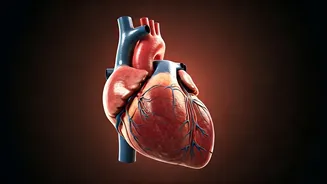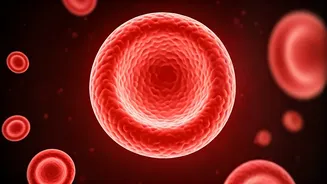Hidden Deficiency
Vitamin B12 deficiency is a common, yet often overlooked, health concern in India, frequently misattributed to stress, ageing, or even depression. This
essential nutrient is vital for red blood cell production, nerve health, and DNA synthesis. When levels are low, the body struggles to function optimally, leading to a range of symptoms. Vegetarians and vegans, who primarily consume plant-based diets, face a higher risk due to the lack of B12 in plant foods. Ageing also plays a role, as the stomach's ability to absorb B12 decreases with time.
Spotting the Signs
Recognizing the symptoms of Vitamin B12 deficiency is crucial, as they can mimic other conditions. Common indicators include persistent fatigue and weakness, which can make daily activities feel challenging. Cognitive issues such as poor concentration, memory lapses, and difficulties with focus can also occur, affecting work and daily life. Furthermore, individuals might experience mood swings and irritability, leading to emotional instability. Another sign is numbness or tingling sensations in the hands and feet, signaling nerve damage. Other symptoms include pale skin, shortness of breath, and balance problems, which can be easily overlooked or mistaken for other issues, making early detection difficult.
Why Indians Vulnerable
Several factors contribute to the higher prevalence of Vitamin B12 deficiency among Indians. The primary reason is dietary habits. B12 is predominantly found in animal products like eggs, milk, fish, and meat. Diets lacking these foods, such as those of vegetarians and vegans, make individuals more susceptible. Studies have shown that nearly half of Indians have insufficient B12 levels. Lifestyle also plays a role, as certain medications, including those for diabetes and acid reflux, can hinder B12 absorption. These factors combined contribute to a growing public health concern, emphasizing the need for awareness and proactive health management.
Addressing the Issue
Addressing Vitamin B12 deficiency involves a multifaceted approach. Dietary modifications play a vital role, especially for those at risk. Including B12-rich foods like eggs, dairy products, and meat can help boost levels. For vegetarians and vegans, supplementation is often necessary to ensure adequate intake. Consulting a healthcare professional is important, allowing for a diagnosis via blood tests. They can guide the best course of action, which could include injections or oral supplements. Early intervention is key to prevent long-term health complications associated with untreated deficiency. Regular health check-ups and dietary awareness can help maintain optimal B12 levels, ensuring overall health and well-being.












